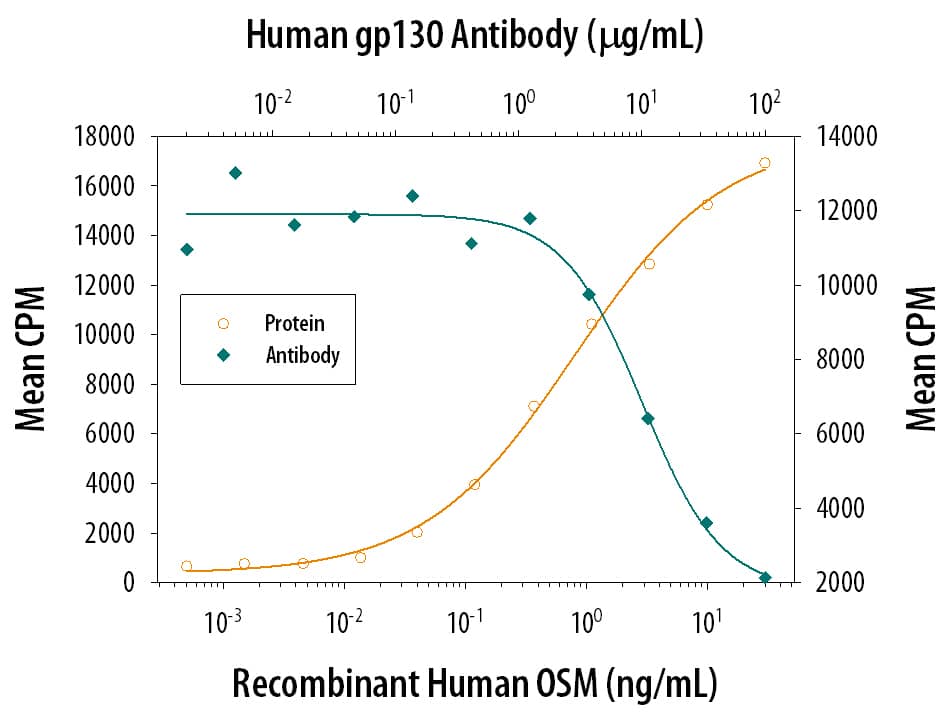Human gp130 Antibody
R&D Systems, part of Bio-Techne | Catalog # AB-228-NA

Key Product Details
Species Reactivity
Applications
Label
Antibody Source
Product Specifications
Immunogen
Leu24-Glu619 (Glu619Asp)
Accession # P40189
Specificity
Clonality
Host
Isotype
Endotoxin Level
Scientific Data Images for Human gp130 Antibody
Cell Proliferation Induced by Oncostatin M/OSM and Neutralization by Human gp130 Antibody.
Recombinant Human Oncostatin M/OSM (Catalog # 295-OM) stimulates proliferation in the TF-1 human erythroleukemic cell line in a dose-dependent manner (orange line). Proliferation elicited by Recombinant Human Oncostatin M/OSM (0.8 ng/mL) is neutralized (green line) by increasing concentrations of Human gp130 Polyclonal Antibody (Catalog # AB-228-NA). The ND50 is typically 20-40 µg/mL.Applications for Human gp130 Antibody
Western Blot
Sample: Recombinant Human gp130 (Catalog # 228-GP)
Neutralization
Formulation, Preparation, and Storage
Purification
Reconstitution
Formulation
Shipping
Stability & Storage
- 12 months from date of receipt, -20 to -70 °C as supplied.
- 1 month, 2 to 8 °C under sterile conditions after reconstitution.
- 6 months, -20 to -70 °C under sterile conditions after reconstitution.
Background: gp130
Gp130, the common signal transducing receptor component shared by the functional receptor complexes of the IL-6 family of cytokines, belongs to the class I cytokine receptor family. Binding of IL-6 (IL-11) to either the membrane-anchored or soluble IL-6 R (IL-11 R) initiates the association of IL-6 R (IL-11 R) with gp130 which then undergoes homo-dimerization and signal transduction. With other IL-6 family cytokines, such as LIF and OSM, signal transduction is triggered by the hetero-dimerization of gp130 and LIF R or OSM R.
Gp130 is expressed in all organs examined. Soluble gp130, which apparently arises either from proteolytic cleavage of the membrane-bound receptor or from alternative splicing, has been detected in human serum. At the present time, the in vivo functions of soluble gp130 are not clearly understood. In in vitro experiments, natural or recombinant soluble gp130 has been shown to have inhibitory effects on OSM and CNTF activities.
References
- Narazaki, M. et al. (1993) Blood 82:1120.
- Taga, T. and T. Kishimoto (1997) Annu. Rev. Immunol. 15:797.
Long Name
Alternate Names
Gene Symbol
UniProt
Additional gp130 Products
Product Documents for Human gp130 Antibody
Product Specific Notices for Human gp130 Antibody
For research use only
